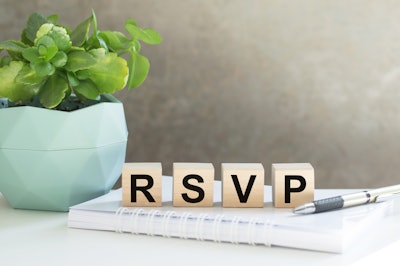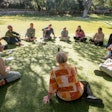
It's the dream for any event marketer: After working so hard to curate your event's content and programming, you officially launch the registration page—and get an influx of excited attendees quickly sending in their RSVPs.
But in the reality of today's oversaturated event market, that's not typically the case, says Jessica Brown, the vice president of strategy at Opus Agency. “[We] find that upwards of 33% of registrants wait to register until just three to four weeks before the event,” she notes.
Early event registrations can, of course, have a lot of benefits, including helping you set your budget, build buzz for the event, and prep for a certain number of people in terms of food, staffing, etc. So, how can you increase your chances of helping those early birds catch the worm? We asked Brown and other experienced event professionals to share their top tips.
1. Get creative with your pricing tiers.
Offering discounted "early bird" pricing is probably the most well-known way to incentivize early registration—but be sure to carefully mind your budget, advises Brown. "Limit the number of passes offered at the discounted rate to mitigate any challenges to your revenue model," she says.
To expand on the idea, Brown also suggests offering group-pass pricing options. "Teams are taking advantage of events to meet as a team in person more than ever," she notes. And, "Replace early birds with 'first movers.' Instead of marketing a discounted price as an 'early bird' rate, position it as a 'first movers' rate to create a fresh perception of the value of attending," Brown adds.
2. Create a sense of urgency and FOMO.
Take a cue from the “everything must go!”-style messaging in the retail world, and create a sense of urgency in your marketing. For Brown, this means focusing on ticket quantity rather than deadlines. "Don't reveal when the discounted price or group pass pricing will expire, but communicate that passes are moving quickly," she suggests.
Amanda Masick, the director of marketing and a virtual event consultant at Event Solutions, likes to encourage RSVPs by leaning into psychology, and creating a counter on email reminders, social media, and the event webpage. "For example, '678 of your coworkers are attending, do you want to join them? RSVP below,'" she cites as an example. "Connecting social media will also allow you to use their data of friends and networks in the counter, [like] '27 of your friends on Facebook are attending.'"
3. Reward those who have attended in the past.
If your event has happened before, focus on people who have attended in the past, suggests Melissa Park, a global event producer and the owner of Melissa Park Events. "Prior to early bird or the first registration phase going live, I send a targeted email to all past attendees offering them incentives to register early," she says, citing options like priority seating, a chance to meet the keynote speaker, access to VIP areas, or exclusive educational sessions.
"Doing this not only demonstrates our appreciation to our loyal attendees; it enables us to gauge interest before tickets go live," she adds.
4. Offer gifts, perks, or exclusive experiences for registering early.
As Park mentioned, offering perks for early birds can be a great way to incentivize registration. "Offer other 'carrots' beyond the price discount for early registrants," suggests Martha Keele, the chief operating officer of event company Toast of the Town. "This could be a swag bag for the first 100 attendees, or even complimentary access to a VIP evening associated with your event. For example, we offered complimentary tickets to an add-on networking event associated with a conference, and it was highly successful in pushing conference registrations."
Jill Garcia, the owner and president of The Hutton Group—Inspired Meetings & Events, also finds that offering incentives is key. "We suggest thinking outside the box about what might tempt potential attendees to register early," she says. Some of her past tactics include offering discounted room rates for a certain number of early registrants, along with things like free receptions, tickets to a special event, or a special arrival gift.
Masick, meanwhile, likes to offer exclusive insider material and content. "For other events, we encourage interaction through allowing guests to 'vote' on elements of the event, such as a choice between two live bands. For family-friendly events, printable coloring pages and other games can be shared through email," she says. "We have even developed games that attendees could play right from their email that highlight elements of the event—all exclusive for early RSVP guests."
5. Consider involving attendees in the planning process.
Letting attendees have a say in the event's content is also a popular way to encourage prompt RSVPs. "Since many have become more conscious of time since 2020, poll attendees in advance on what they would like to see and do," suggests Garcia. "Then create a plan according to those results. Market the idea that this is their meeting, not just yours."
Dominic Phillips, the founder of experiential agency DPEM, also likes to involve attendees in the planning process. "At the start of your planning, go to your Instagram pages, Reddit threads, or LinkedIn groups and ask potential attendees their opinions on programming—and truly listen to them," he says, citing examples like SXSW, which crowdsources its panels and panelists via surveys.
"When you incorporate their ideas, you can go back to that same group to thank them for their involvement and share your registration page," he adds. "By creating an emotional connection, they will want to invest in the event as they feel it was created with them, not just for them."
6. Make the RSVP technology quick, painless, and mobile-friendly.
"Attendees want ease!" says Garcia, noting that attendees are more likely to register early if the process is simple. "Often the registration site is so complex that attendees attempt to sign in, save it for later, and forget about it until it is too late."
Masick, whose role includes developing Event Solutions' websites and digital RSVP systems, agrees—adding that the process should always be mobile friendly. Her tips? Make sure the text is large enough to be read with ease, without needing to zoom in, and limit how long registrants need to scroll. And above all, make sure your links work! "Be sure to test them yourself," she says. "Even third-party systems should be tested and run through on different phones, Chrome, Firefox, etc."
7. Share social media graphics with attendees, not just speakers.
Feyisola Ogunfemi, an event business consultant and the owner of Statuesque Events, likes creating attendee badges for guests to share on social media, the same way you might for a speaker.
"The custom event badges [can] look similar to speaker images and tell a bit about the person who has registered," she says. "Posting these consistently helps people to see visually that others are registering and creates a bit of FOMO, and encourages people to buy and others to reach out to partner with you. Everyone wants to be in a full room, and badges help people to literally see that others will be there."
8. Send timely reminders at strategic times.
Remember to send follow-up messages with the invite and RSVP link, and plan your timing carefully to elicit the most responses. "Avoid times when your attendees would be consumed with other things, such as rush hour, or the release of the latest episode of a hot TV show, or the Super Bowl," suggests Masick.
And make sure to be responsive! "Ensure they get a clear confirmation [after registering]," Masick adds. "In the world of technology, redundancy is king. Have a 'Thank you for ...' on page, [and] an email confirmation followed by a copy of the registration/tickets."
9. Clearly communicate the value the event will offer.
Ultimately, the best way to get responses is to create a great event—and find ways to clearly communicate why attendees need to be there. "Be creative in planning an agenda different from previous years that may include additional networking opportunities or activities," Garcia says. "Shake up the content, make people want to attend, and create the fear of missing out."
Another tip? Keele advises to, when possible, name your keynote speakers as soon as you launch registration in order to build excitement. "After all, it's challenging to get someone to register for an event that they don't know who is speaking or what the annual theme will be," she points out. "Create a buzz for the date registration opens by launching a marketing campaign. Use email drip campaigns and social media advertising to spread awareness. [And] continue to announce speakers or exciting portions of the event throughout the early-bird registration dates to motivate people to register."
Beyond the big-name speakers, Lee Gimpel, the founder of Better Meetings, also advises publicizing the "real" people who are attending. "Attendees know that they’re probably not going to be hanging out with the person who delivered the keynote," he points out. "Including regular attendees in the promotion is partly about what marketers call social proof: that you see there are people like you who believe this will be a worthwhile event and, as a result, they’ve already committed to being there."
Gimpel likes adding a section to the event's website with the names of general attendees, the same way you might for speakers. "Attendees often judge a conference not just by the content it can deliver, but also by the connections that one will make there. It also helps attendees understand that they have a role in the event even if they’re not on the dais, per se," he notes. "A side benefit is that it may also get those folks who are now in the spotlight to share the event more than they otherwise would, because they're now informal representatives of the event."



















